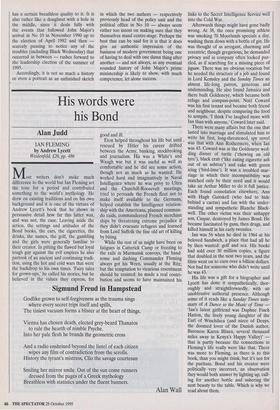His words were his Bond
Alan Judd
IAN FLEMING by Andrew Lycett Weidenfeld, £20, pp. 486 Most writers don't make much difference to the world but Ian Fleming set the tone for a period and contributed something to the world's mythology. He drew on existing traditions and on his own background and it is one of the virtues of Andrew Lycett's book that he shows in persuasive detail how far this latter was, and was not, the case. Leaving aside the action, the settings and attitudes of the Bond books, the cars, the cigarettes, the drinks, the names, the golf, the gambling and the girls were generally familiar to their creator. In pitting the flawed but loyal tough guy against the evil empires he also partook of an ancient and continuing tradi- tion, using the hot and cold wars that were the backdrop to his own times. 'Fairy tales for grown-ups,' he called his stories, but he believed in the values they express, for good and ill.
Eton helped throughout his life but until , rescued by Hitler his career drifted between the Army, banking, stockbroking and journalism. His was a White's and Waugh war but it was useful as well as comfortable and he did see some action, though not as much as he wanted. He worked hard and imaginatively in Naval Intelligence where he was privy to Ultra and the Churchill-Roosevelt meetings, tried to persuade the French fleet not to make itself available to the Germans, helped establish the Intelligence relation- ship with the Americans, planned comman- do raids, commandeered French merchant ships by threatening extreme prejudice if they didn't evacuate refugees and learned from Lord Suffolk the fine old art of killing by biting.
While the rest of us might have been on fatigues in Catterick Camp or freezing to the rails in Murmansk convoys, the hand- some and dashing Commander Fleming always got his Wren, usually at the Ritz; but the temptation to vicarious resentment should be resisted: he made a real contri- bution and seems to have maintained his links to the Secret Intelligence Service well into the Cold War.
Afterwards things might have gone badly wrong. At 38, the once promising athlete was smoking 70 Moorlands specials a day, washing them down with a bottle of gin. He was thought of as arrogant, charming and eccentric; though gregarious, he demanded privacy and in company often looked puz- zled, as if searching for a missing piece of jigsaw. There was no obvious vocation but he needed the structure of a job and found in Lord Kemsley and the Sunday Times an almost life-long patron, generous and undemanding. He also found Jamaica and there built Goldeneye, which became both refuge and compass-point. Noel Coward was his first tenant and became both friend and neighbour, despite comparing the food to armpits. 'I think I've laughed more with Ian than with anyone,' Coward later said.
There were many affairs but the one that lasted into marriage and stimulated him to write his first, long-threatened, spy novel was that with Ann Rothermere, when Ian was 43. Coward was at the Goldeneye wed- ding dinner of turtle (`chewing an old tyre'), black crab (like eating cigarette ash out of an ashtray') and cake with green icing (`bird-lime'). It was a troubled mar- riage in which their incompatibility was matched only by their need and it would take an Arthur Miller to do it full justice. Each found consolation elsewhere, Ann with Hugh Gaitskell (who had to hide behind a cactus) and Ian with the under- standing and sympathetic Blanche Black- well. The other victim was their unhappy son, Caspar, destroyed by James Bond. He became fascinated by guns, then drugs, and killed himself in his early twenties.
Ian was 56 when he died in 1964 at his beloved Sandwich, a place that had all he by then wanted: golf and sea. His books had sold over 30 million copies, a figure that doubled in the next two years, and the films went on to earn over a billion dollars. Not bad for someone who didn't write until he was 43.
His life was a gift for a biographer and Lycett has done it sympathetically, thor- oughly and straightforwardly, with an unobtrusive authorial presence. Although some of it reads like a Sunday Times sum- mary of A Dance to the Music of Time 'Ian's latest girlfriend was Daphne Finch Hatton, the lively young daughter of the Earl of Winchilsea (and niece of Denys, the doomed lover of the Danish author, Baroness Karen Blixen, several thousand miles away in Kenya's Happy Valley)' that is partly because the connections in Fleming's life really were like that. There was more to Fleming, as there is to this book, than you might think, but it's not for the puritans. Bond and his creator were politically very incorrect, an observation they would both answer by lighting up, call- ing for another bottle and ushering the next beauty to the table. Which is why we read about them.


































































 Previous page
Previous page